Tourism Sector Analysis Report: Impact of TUI Group on the Industry
VerifiedAdded on 2020/06/03
|14
|4326
|106
Report
AI Summary
This report provides an analysis of the tourism sector, focusing on the impact of TUI Group. It examines the company's structure, functions, and influence on the industry. The report delves into the effects of political factors on tourism, highlighting how changes in policies can both attract and deter tourists. It also explores the elements influencing tourism demand, including supply chain dynamics and the role of pricing and customer service. Furthermore, the report discusses the positive and negative social, environmental, and economic impacts of tourism, offering strategies to mitigate negative effects and enhance positive outcomes. The analysis covers various aspects, from marketing strategies to customer satisfaction, providing a comprehensive overview of the tourism sector and TUI Group's position within it.
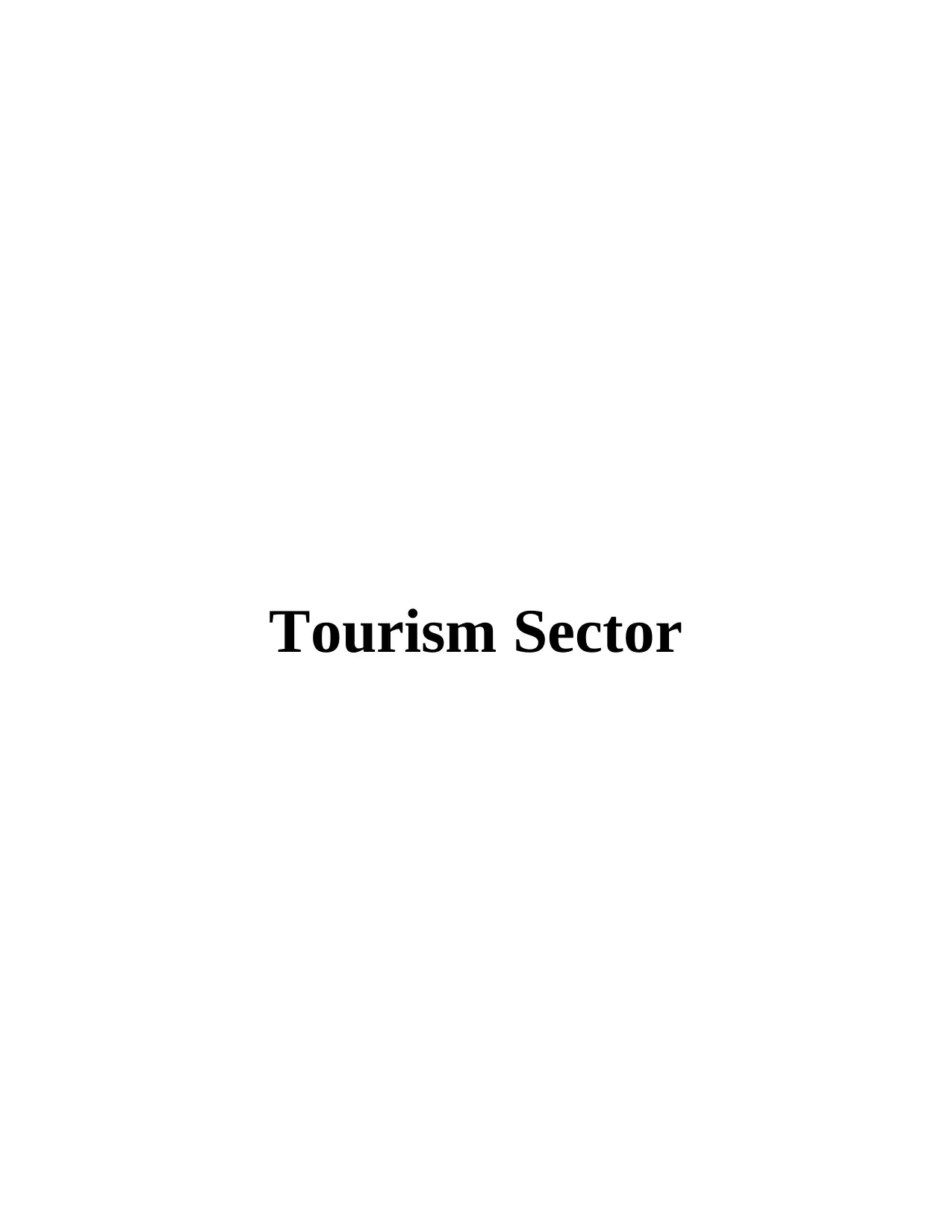
Tourism Sector
Paraphrase This Document
Need a fresh take? Get an instant paraphrase of this document with our AI Paraphraser
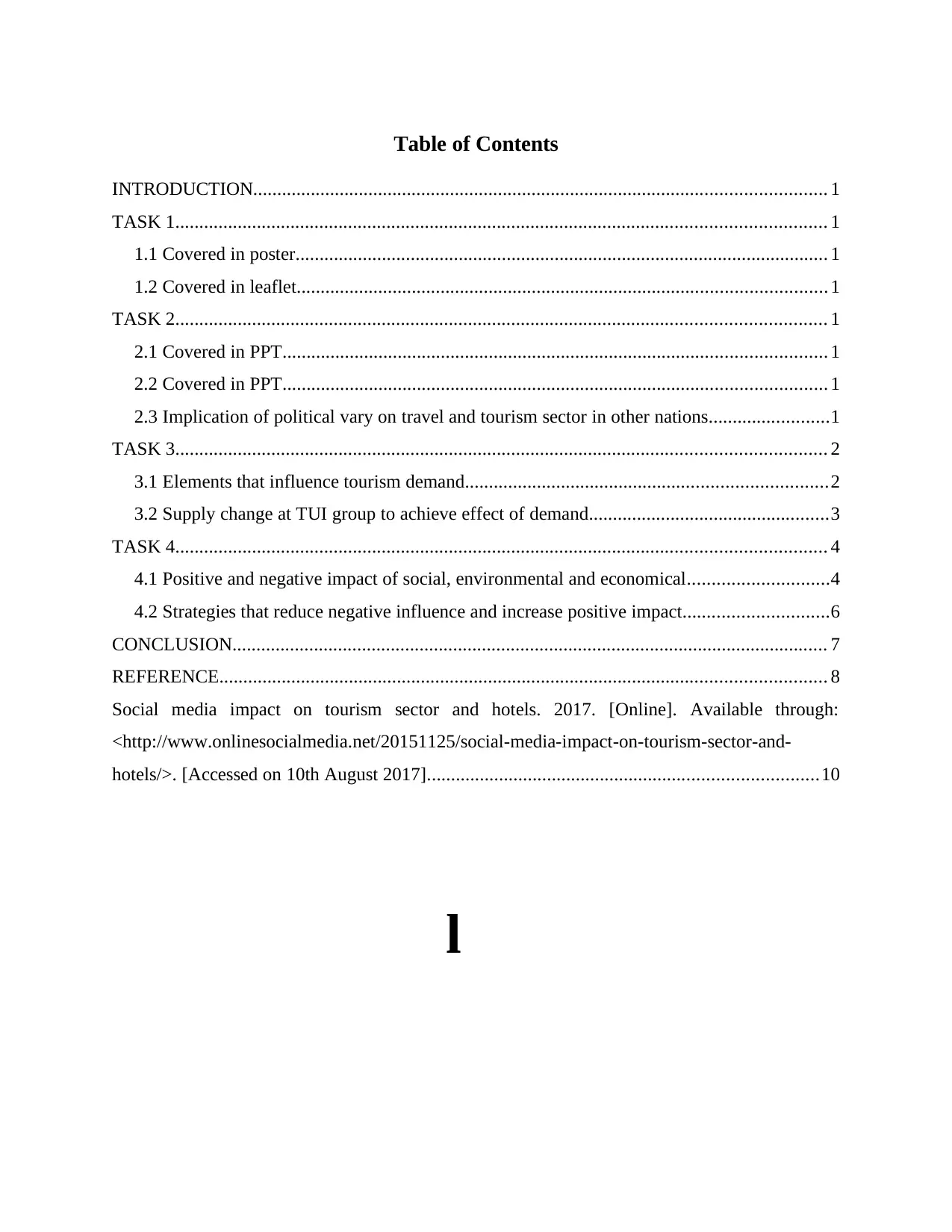
Table of Contents
INTRODUCTION....................................................................................................................... 1
TASK 1....................................................................................................................................... 1
1.1 Covered in poster............................................................................................................... 1
1.2 Covered in leaflet.............................................................................................................. 1
TASK 2....................................................................................................................................... 1
2.1 Covered in PPT................................................................................................................. 1
2.2 Covered in PPT................................................................................................................. 1
2.3 Implication of political vary on travel and tourism sector in other nations.........................1
TASK 3....................................................................................................................................... 2
3.1 Elements that influence tourism demand...........................................................................2
3.2 Supply change at TUI group to achieve effect of demand..................................................3
TASK 4....................................................................................................................................... 4
4.1 Positive and negative impact of social, environmental and economical.............................4
4.2 Strategies that reduce negative influence and increase positive impact..............................6
CONCLUSION............................................................................................................................ 7
REFERENCE.............................................................................................................................. 8
Social media impact on tourism sector and hotels. 2017. [Online]. Available through:
<http://www.onlinesocialmedia.net/20151125/social-media-impact-on-tourism-sector-and-
hotels/>. [Accessed on 10th August 2017].................................................................................10
l壱
INTRODUCTION....................................................................................................................... 1
TASK 1....................................................................................................................................... 1
1.1 Covered in poster............................................................................................................... 1
1.2 Covered in leaflet.............................................................................................................. 1
TASK 2....................................................................................................................................... 1
2.1 Covered in PPT................................................................................................................. 1
2.2 Covered in PPT................................................................................................................. 1
2.3 Implication of political vary on travel and tourism sector in other nations.........................1
TASK 3....................................................................................................................................... 2
3.1 Elements that influence tourism demand...........................................................................2
3.2 Supply change at TUI group to achieve effect of demand..................................................3
TASK 4....................................................................................................................................... 4
4.1 Positive and negative impact of social, environmental and economical.............................4
4.2 Strategies that reduce negative influence and increase positive impact..............................6
CONCLUSION............................................................................................................................ 7
REFERENCE.............................................................................................................................. 8
Social media impact on tourism sector and hotels. 2017. [Online]. Available through:
<http://www.onlinesocialmedia.net/20151125/social-media-impact-on-tourism-sector-and-
hotels/>. [Accessed on 10th August 2017].................................................................................10
l壱
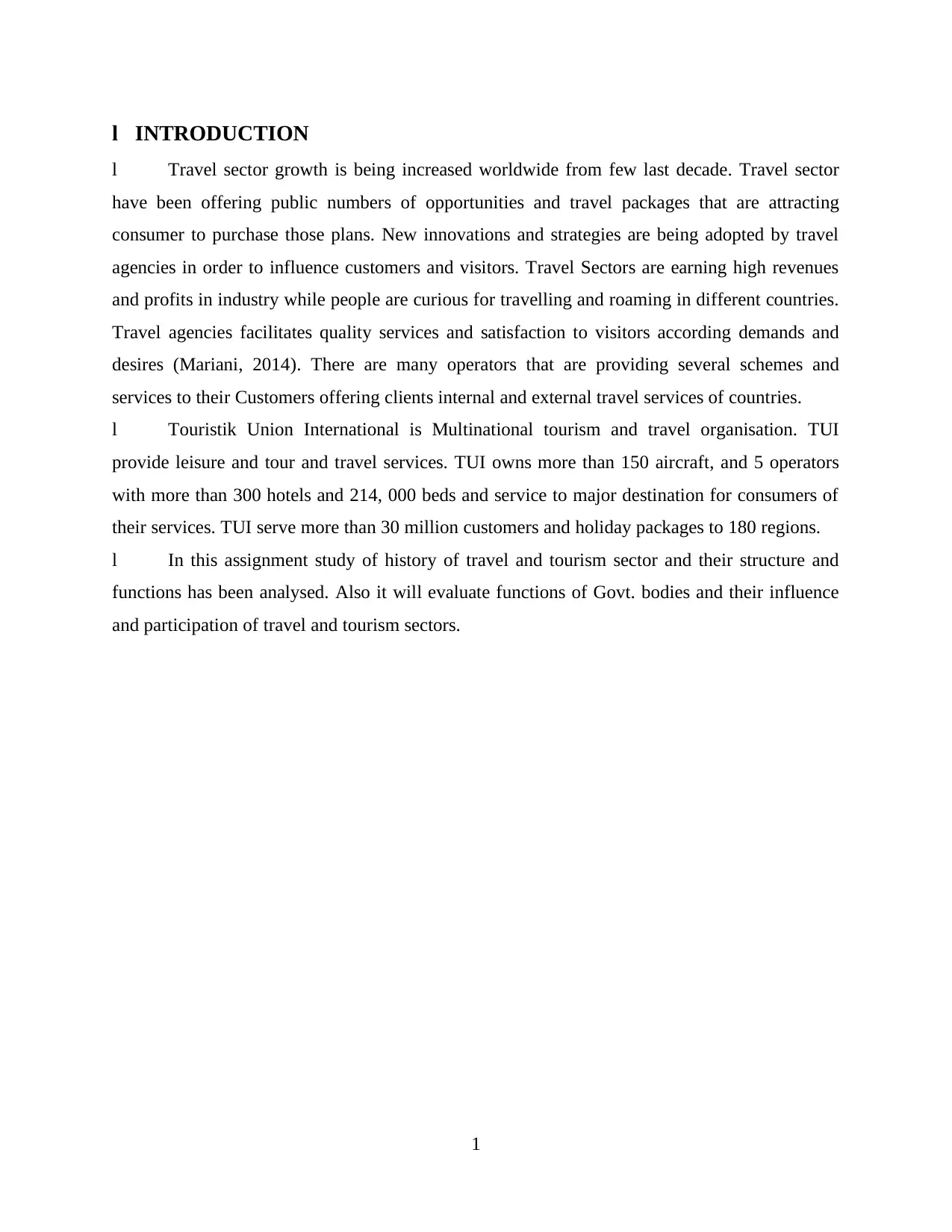
l壱INTRODUCTION
l弐 Travel sector growth is being increased worldwide from few last decade. Travel sector
have been offering public numbers of opportunities and travel packages that are attracting
consumer to purchase those plans. New innovations and strategies are being adopted by travel
agencies in order to influence customers and visitors. Travel Sectors are earning high revenues
and profits in industry while people are curious for travelling and roaming in different countries.
Travel agencies facilitates quality services and satisfaction to visitors according demands and
desires (Mariani, 2014). There are many operators that are providing several schemes and
services to their Customers offering clients internal and external travel services of countries.
l弐 Touristik Union International is Multinational tourism and travel organisation. TUI
provide leisure and tour and travel services. TUI owns more than 150 aircraft, and 5 operators
with more than 300 hotels and 214, 000 beds and service to major destination for consumers of
their services. TUI serve more than 30 million customers and holiday packages to 180 regions.
l弐 In this assignment study of history of travel and tourism sector and their structure and
functions has been analysed. Also it will evaluate functions of Govt. bodies and their influence
and participation of travel and tourism sectors.
1
l弐 Travel sector growth is being increased worldwide from few last decade. Travel sector
have been offering public numbers of opportunities and travel packages that are attracting
consumer to purchase those plans. New innovations and strategies are being adopted by travel
agencies in order to influence customers and visitors. Travel Sectors are earning high revenues
and profits in industry while people are curious for travelling and roaming in different countries.
Travel agencies facilitates quality services and satisfaction to visitors according demands and
desires (Mariani, 2014). There are many operators that are providing several schemes and
services to their Customers offering clients internal and external travel services of countries.
l弐 Touristik Union International is Multinational tourism and travel organisation. TUI
provide leisure and tour and travel services. TUI owns more than 150 aircraft, and 5 operators
with more than 300 hotels and 214, 000 beds and service to major destination for consumers of
their services. TUI serve more than 30 million customers and holiday packages to 180 regions.
l弐 In this assignment study of history of travel and tourism sector and their structure and
functions has been analysed. Also it will evaluate functions of Govt. bodies and their influence
and participation of travel and tourism sectors.
1
⊘ This is a preview!⊘
Do you want full access?
Subscribe today to unlock all pages.

Trusted by 1+ million students worldwide
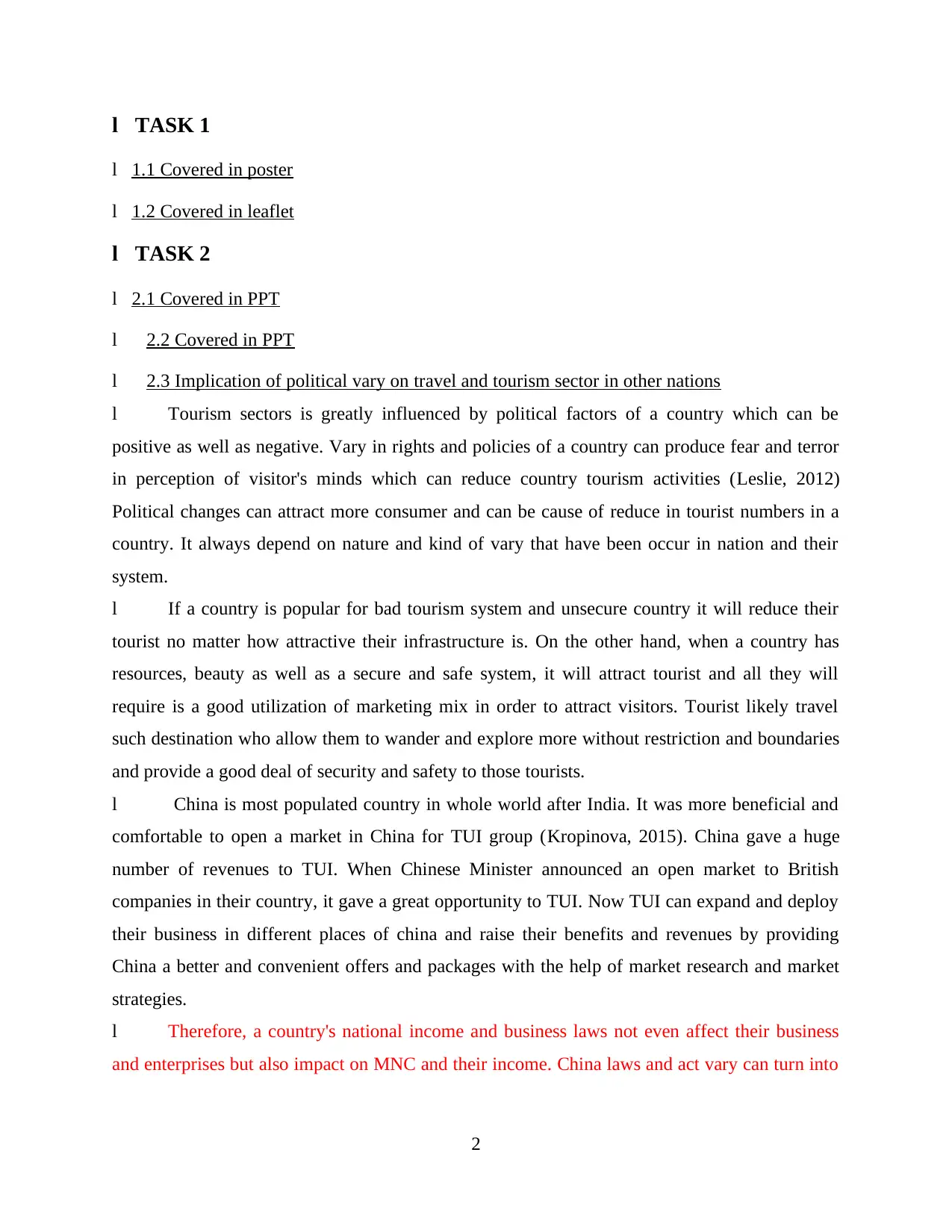
l壱TASK 1
l弐1.1 Covered in poster
l弐1.2 Covered in leaflet
l壱TASK 2
l弐2.1 Covered in PPT
l弐弐2.2 Covered in PPT
l弐弐2.3 Implication of political vary on travel and tourism sector in other nations
l弐弐 Tourism sectors is greatly influenced by political factors of a country which can be
positive as well as negative. Vary in rights and policies of a country can produce fear and terror
in perception of visitor's minds which can reduce country tourism activities (Leslie, 2012)
Political changes can attract more consumer and can be cause of reduce in tourist numbers in a
country. It always depend on nature and kind of vary that have been occur in nation and their
system.
l弐弐 If a country is popular for bad tourism system and unsecure country it will reduce their
tourist no matter how attractive their infrastructure is. On the other hand, when a country has
resources, beauty as well as a secure and safe system, it will attract tourist and all they will
require is a good utilization of marketing mix in order to attract visitors. Tourist likely travel
such destination who allow them to wander and explore more without restriction and boundaries
and provide a good deal of security and safety to those tourists.
l弐弐 China is most populated country in whole world after India. It was more beneficial and
comfortable to open a market in China for TUI group (Kropinova, 2015). China gave a huge
number of revenues to TUI. When Chinese Minister announced an open market to British
companies in their country, it gave a great opportunity to TUI. Now TUI can expand and deploy
their business in different places of china and raise their benefits and revenues by providing
China a better and convenient offers and packages with the help of market research and market
strategies.
l弐弐 Therefore, a country's national income and business laws not even affect their business
and enterprises but also impact on MNC and their income. China laws and act vary can turn into
2
l弐1.1 Covered in poster
l弐1.2 Covered in leaflet
l壱TASK 2
l弐2.1 Covered in PPT
l弐弐2.2 Covered in PPT
l弐弐2.3 Implication of political vary on travel and tourism sector in other nations
l弐弐 Tourism sectors is greatly influenced by political factors of a country which can be
positive as well as negative. Vary in rights and policies of a country can produce fear and terror
in perception of visitor's minds which can reduce country tourism activities (Leslie, 2012)
Political changes can attract more consumer and can be cause of reduce in tourist numbers in a
country. It always depend on nature and kind of vary that have been occur in nation and their
system.
l弐弐 If a country is popular for bad tourism system and unsecure country it will reduce their
tourist no matter how attractive their infrastructure is. On the other hand, when a country has
resources, beauty as well as a secure and safe system, it will attract tourist and all they will
require is a good utilization of marketing mix in order to attract visitors. Tourist likely travel
such destination who allow them to wander and explore more without restriction and boundaries
and provide a good deal of security and safety to those tourists.
l弐弐 China is most populated country in whole world after India. It was more beneficial and
comfortable to open a market in China for TUI group (Kropinova, 2015). China gave a huge
number of revenues to TUI. When Chinese Minister announced an open market to British
companies in their country, it gave a great opportunity to TUI. Now TUI can expand and deploy
their business in different places of china and raise their benefits and revenues by providing
China a better and convenient offers and packages with the help of market research and market
strategies.
l弐弐 Therefore, a country's national income and business laws not even affect their business
and enterprises but also impact on MNC and their income. China laws and act vary can turn into
2
Paraphrase This Document
Need a fresh take? Get an instant paraphrase of this document with our AI Paraphraser
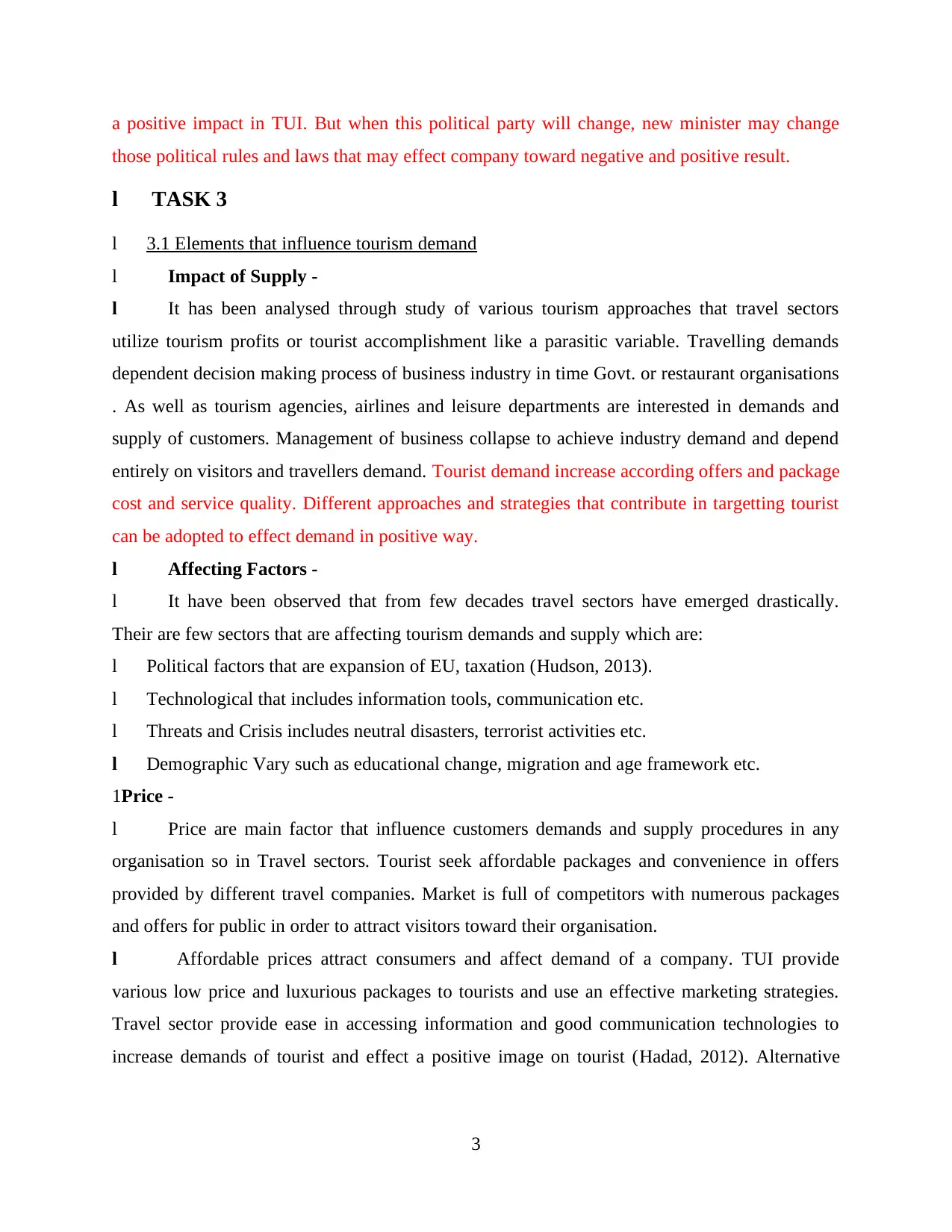
a positive impact in TUI. But when this political party will change, new minister may change
those political rules and laws that may effect company toward negative and positive result.
l壱壱TASK 3
l弐弐3.1 Elements that influence tourism demand
l弐弐 Impact of Supply -
l壱壱 It has been analysed through study of various tourism approaches that travel sectors
utilize tourism profits or tourist accomplishment like a parasitic variable. Travelling demands
dependent decision making process of business industry in time Govt. or restaurant organisations
. As well as tourism agencies, airlines and leisure departments are interested in demands and
supply of customers. Management of business collapse to achieve industry demand and depend
entirely on visitors and travellers demand. Tourist demand increase according offers and package
cost and service quality. Different approaches and strategies that contribute in targetting tourist
can be adopted to effect demand in positive way.
l壱壱 Affecting Factors -
l弐弐 It have been observed that from few decades travel sectors have emerged drastically.
Their are few sectors that are affecting tourism demands and supply which are:
l弐弐Political factors that are expansion of EU, taxation (Hudson, 2013).
l弐弐Technological that includes information tools, communication etc.
l弐弐Threats and Crisis includes neutral disasters, terrorist activities etc.
l壱壱Demographic Vary such as educational change, migration and age framework etc.
1Price -
l弐 Price are main factor that influence customers demands and supply procedures in any
organisation so in Travel sectors. Tourist seek affordable packages and convenience in offers
provided by different travel companies. Market is full of competitors with numerous packages
and offers for public in order to attract visitors toward their organisation.
l壱 Affordable prices attract consumers and affect demand of a company. TUI provide
various low price and luxurious packages to tourists and use an effective marketing strategies.
Travel sector provide ease in accessing information and good communication technologies to
increase demands of tourist and effect a positive image on tourist (Hadad, 2012). Alternative
3
those political rules and laws that may effect company toward negative and positive result.
l壱壱TASK 3
l弐弐3.1 Elements that influence tourism demand
l弐弐 Impact of Supply -
l壱壱 It has been analysed through study of various tourism approaches that travel sectors
utilize tourism profits or tourist accomplishment like a parasitic variable. Travelling demands
dependent decision making process of business industry in time Govt. or restaurant organisations
. As well as tourism agencies, airlines and leisure departments are interested in demands and
supply of customers. Management of business collapse to achieve industry demand and depend
entirely on visitors and travellers demand. Tourist demand increase according offers and package
cost and service quality. Different approaches and strategies that contribute in targetting tourist
can be adopted to effect demand in positive way.
l壱壱 Affecting Factors -
l弐弐 It have been observed that from few decades travel sectors have emerged drastically.
Their are few sectors that are affecting tourism demands and supply which are:
l弐弐Political factors that are expansion of EU, taxation (Hudson, 2013).
l弐弐Technological that includes information tools, communication etc.
l弐弐Threats and Crisis includes neutral disasters, terrorist activities etc.
l壱壱Demographic Vary such as educational change, migration and age framework etc.
1Price -
l弐 Price are main factor that influence customers demands and supply procedures in any
organisation so in Travel sectors. Tourist seek affordable packages and convenience in offers
provided by different travel companies. Market is full of competitors with numerous packages
and offers for public in order to attract visitors toward their organisation.
l壱 Affordable prices attract consumers and affect demand of a company. TUI provide
various low price and luxurious packages to tourists and use an effective marketing strategies.
Travel sector provide ease in accessing information and good communication technologies to
increase demands of tourist and effect a positive image on tourist (Hadad, 2012). Alternative
3
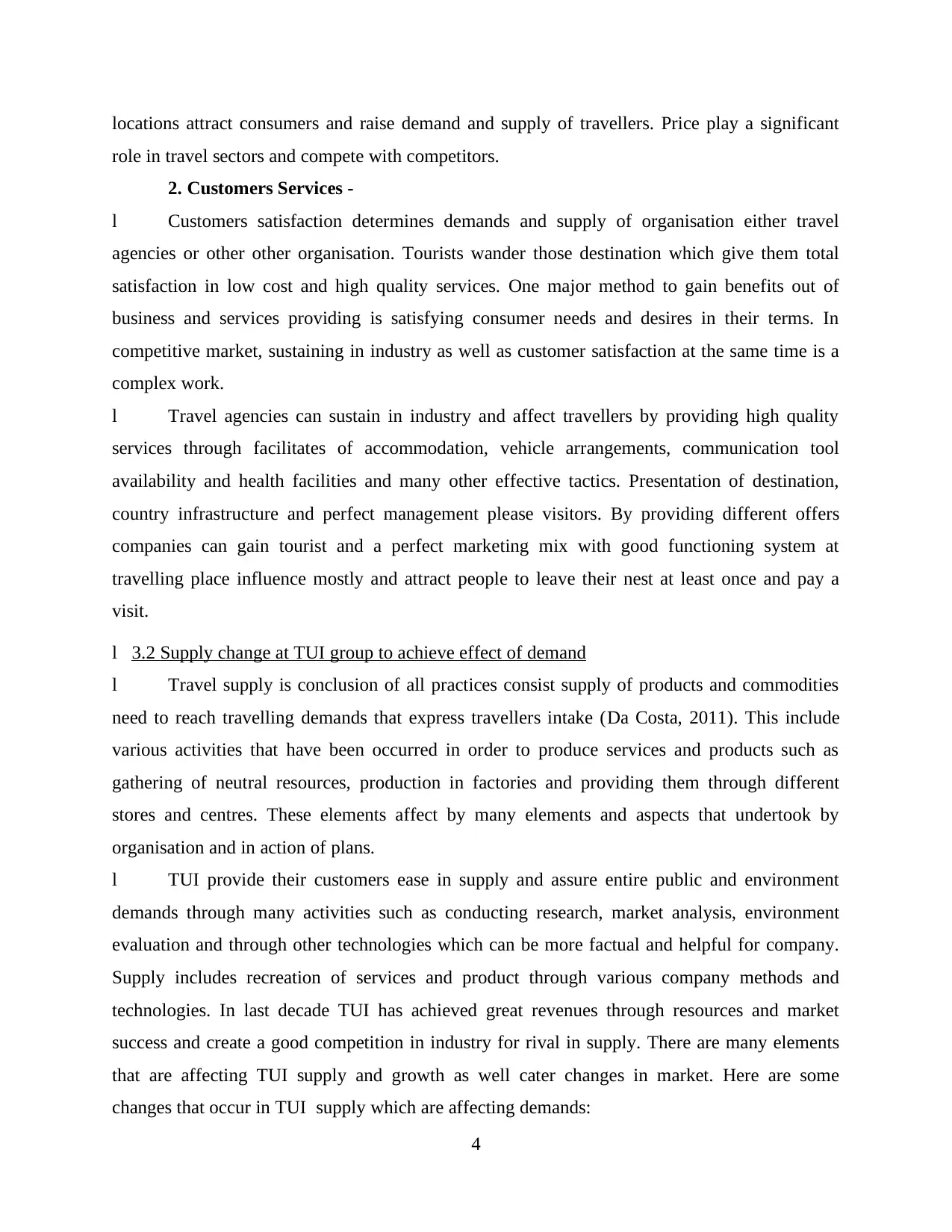
locations attract consumers and raise demand and supply of travellers. Price play a significant
role in travel sectors and compete with competitors.
2. Customers Services -
l弐 Customers satisfaction determines demands and supply of organisation either travel
agencies or other other organisation. Tourists wander those destination which give them total
satisfaction in low cost and high quality services. One major method to gain benefits out of
business and services providing is satisfying consumer needs and desires in their terms. In
competitive market, sustaining in industry as well as customer satisfaction at the same time is a
complex work.
l弐 Travel agencies can sustain in industry and affect travellers by providing high quality
services through facilitates of accommodation, vehicle arrangements, communication tool
availability and health facilities and many other effective tactics. Presentation of destination,
country infrastructure and perfect management please visitors. By providing different offers
companies can gain tourist and a perfect marketing mix with good functioning system at
travelling place influence mostly and attract people to leave their nest at least once and pay a
visit.
l弐3.2 Supply change at TUI group to achieve effect of demand
l弐 Travel supply is conclusion of all practices consist supply of products and commodities
need to reach travelling demands that express travellers intake (Da Costa, 2011). This include
various activities that have been occurred in order to produce services and products such as
gathering of neutral resources, production in factories and providing them through different
stores and centres. These elements affect by many elements and aspects that undertook by
organisation and in action of plans.
l弐 TUI provide their customers ease in supply and assure entire public and environment
demands through many activities such as conducting research, market analysis, environment
evaluation and through other technologies which can be more factual and helpful for company.
Supply includes recreation of services and product through various company methods and
technologies. In last decade TUI has achieved great revenues through resources and market
success and create a good competition in industry for rival in supply. There are many elements
that are affecting TUI supply and growth as well cater changes in market. Here are some
changes that occur in TUI supply which are affecting demands:
4
role in travel sectors and compete with competitors.
2. Customers Services -
l弐 Customers satisfaction determines demands and supply of organisation either travel
agencies or other other organisation. Tourists wander those destination which give them total
satisfaction in low cost and high quality services. One major method to gain benefits out of
business and services providing is satisfying consumer needs and desires in their terms. In
competitive market, sustaining in industry as well as customer satisfaction at the same time is a
complex work.
l弐 Travel agencies can sustain in industry and affect travellers by providing high quality
services through facilitates of accommodation, vehicle arrangements, communication tool
availability and health facilities and many other effective tactics. Presentation of destination,
country infrastructure and perfect management please visitors. By providing different offers
companies can gain tourist and a perfect marketing mix with good functioning system at
travelling place influence mostly and attract people to leave their nest at least once and pay a
visit.
l弐3.2 Supply change at TUI group to achieve effect of demand
l弐 Travel supply is conclusion of all practices consist supply of products and commodities
need to reach travelling demands that express travellers intake (Da Costa, 2011). This include
various activities that have been occurred in order to produce services and products such as
gathering of neutral resources, production in factories and providing them through different
stores and centres. These elements affect by many elements and aspects that undertook by
organisation and in action of plans.
l弐 TUI provide their customers ease in supply and assure entire public and environment
demands through many activities such as conducting research, market analysis, environment
evaluation and through other technologies which can be more factual and helpful for company.
Supply includes recreation of services and product through various company methods and
technologies. In last decade TUI has achieved great revenues through resources and market
success and create a good competition in industry for rival in supply. There are many elements
that are affecting TUI supply and growth as well cater changes in market. Here are some
changes that occur in TUI supply which are affecting demands:
4
⊘ This is a preview!⊘
Do you want full access?
Subscribe today to unlock all pages.

Trusted by 1+ million students worldwide
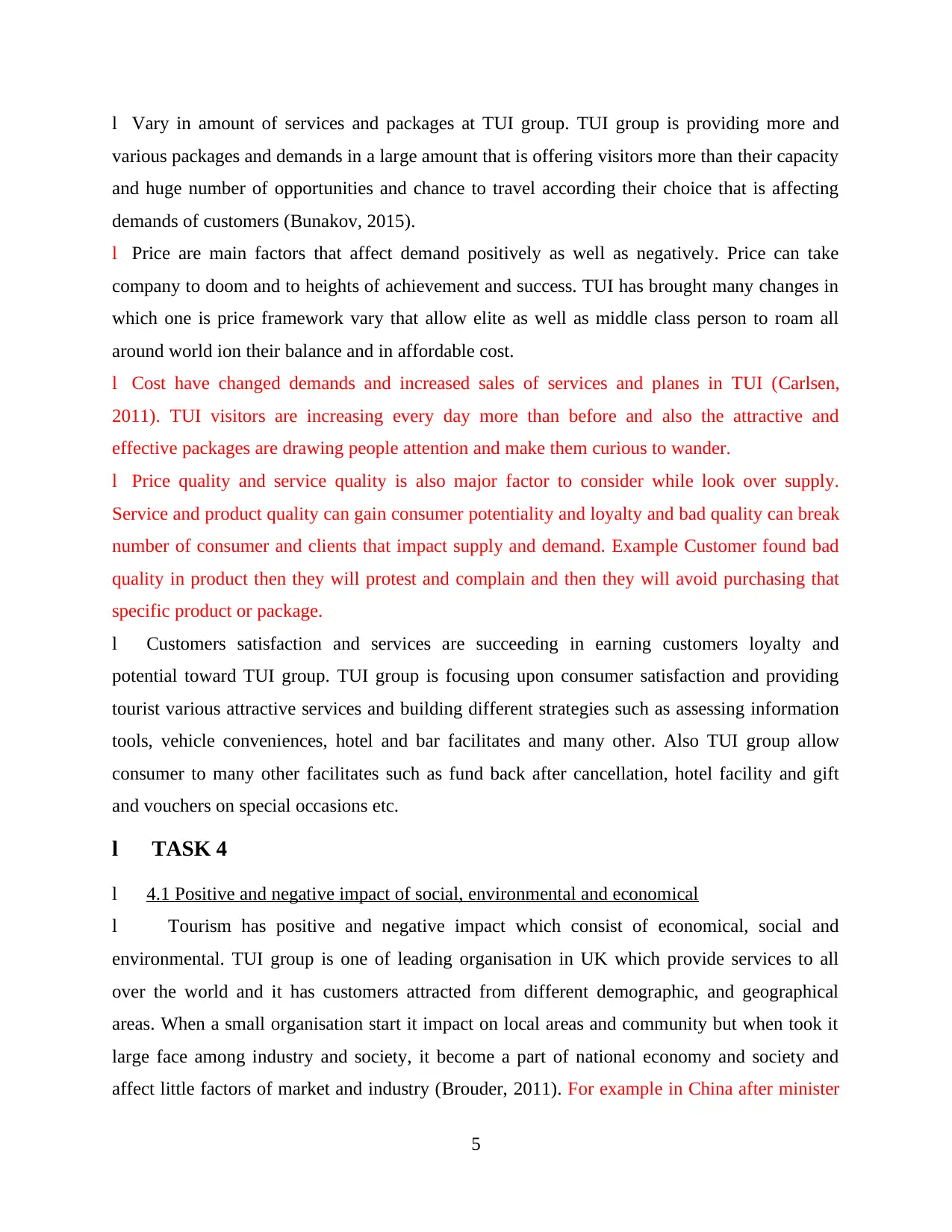
l弐Vary in amount of services and packages at TUI group. TUI group is providing more and
various packages and demands in a large amount that is offering visitors more than their capacity
and huge number of opportunities and chance to travel according their choice that is affecting
demands of customers (Bunakov, 2015).
l弐Price are main factors that affect demand positively as well as negatively. Price can take
company to doom and to heights of achievement and success. TUI has brought many changes in
which one is price framework vary that allow elite as well as middle class person to roam all
around world ion their balance and in affordable cost.
l弐Cost have changed demands and increased sales of services and planes in TUI (Carlsen,
2011). TUI visitors are increasing every day more than before and also the attractive and
effective packages are drawing people attention and make them curious to wander.
l弐Price quality and service quality is also major factor to consider while look over supply.
Service and product quality can gain consumer potentiality and loyalty and bad quality can break
number of consumer and clients that impact supply and demand. Example Customer found bad
quality in product then they will protest and complain and then they will avoid purchasing that
specific product or package.
l弐弐Customers satisfaction and services are succeeding in earning customers loyalty and
potential toward TUI group. TUI group is focusing upon consumer satisfaction and providing
tourist various attractive services and building different strategies such as assessing information
tools, vehicle conveniences, hotel and bar facilitates and many other. Also TUI group allow
consumer to many other facilitates such as fund back after cancellation, hotel facility and gift
and vouchers on special occasions etc.
l壱壱TASK 4
l弐弐4.1 Positive and negative impact of social, environmental and economical
l弐弐 Tourism has positive and negative impact which consist of economical, social and
environmental. TUI group is one of leading organisation in UK which provide services to all
over the world and it has customers attracted from different demographic, and geographical
areas. When a small organisation start it impact on local areas and community but when took it
large face among industry and society, it become a part of national economy and society and
affect little factors of market and industry (Brouder, 2011). For example in China after minister
5
various packages and demands in a large amount that is offering visitors more than their capacity
and huge number of opportunities and chance to travel according their choice that is affecting
demands of customers (Bunakov, 2015).
l弐Price are main factors that affect demand positively as well as negatively. Price can take
company to doom and to heights of achievement and success. TUI has brought many changes in
which one is price framework vary that allow elite as well as middle class person to roam all
around world ion their balance and in affordable cost.
l弐Cost have changed demands and increased sales of services and planes in TUI (Carlsen,
2011). TUI visitors are increasing every day more than before and also the attractive and
effective packages are drawing people attention and make them curious to wander.
l弐Price quality and service quality is also major factor to consider while look over supply.
Service and product quality can gain consumer potentiality and loyalty and bad quality can break
number of consumer and clients that impact supply and demand. Example Customer found bad
quality in product then they will protest and complain and then they will avoid purchasing that
specific product or package.
l弐弐Customers satisfaction and services are succeeding in earning customers loyalty and
potential toward TUI group. TUI group is focusing upon consumer satisfaction and providing
tourist various attractive services and building different strategies such as assessing information
tools, vehicle conveniences, hotel and bar facilitates and many other. Also TUI group allow
consumer to many other facilitates such as fund back after cancellation, hotel facility and gift
and vouchers on special occasions etc.
l壱壱TASK 4
l弐弐4.1 Positive and negative impact of social, environmental and economical
l弐弐 Tourism has positive and negative impact which consist of economical, social and
environmental. TUI group is one of leading organisation in UK which provide services to all
over the world and it has customers attracted from different demographic, and geographical
areas. When a small organisation start it impact on local areas and community but when took it
large face among industry and society, it become a part of national economy and society and
affect little factors of market and industry (Brouder, 2011). For example in China after minister
5
Paraphrase This Document
Need a fresh take? Get an instant paraphrase of this document with our AI Paraphraser
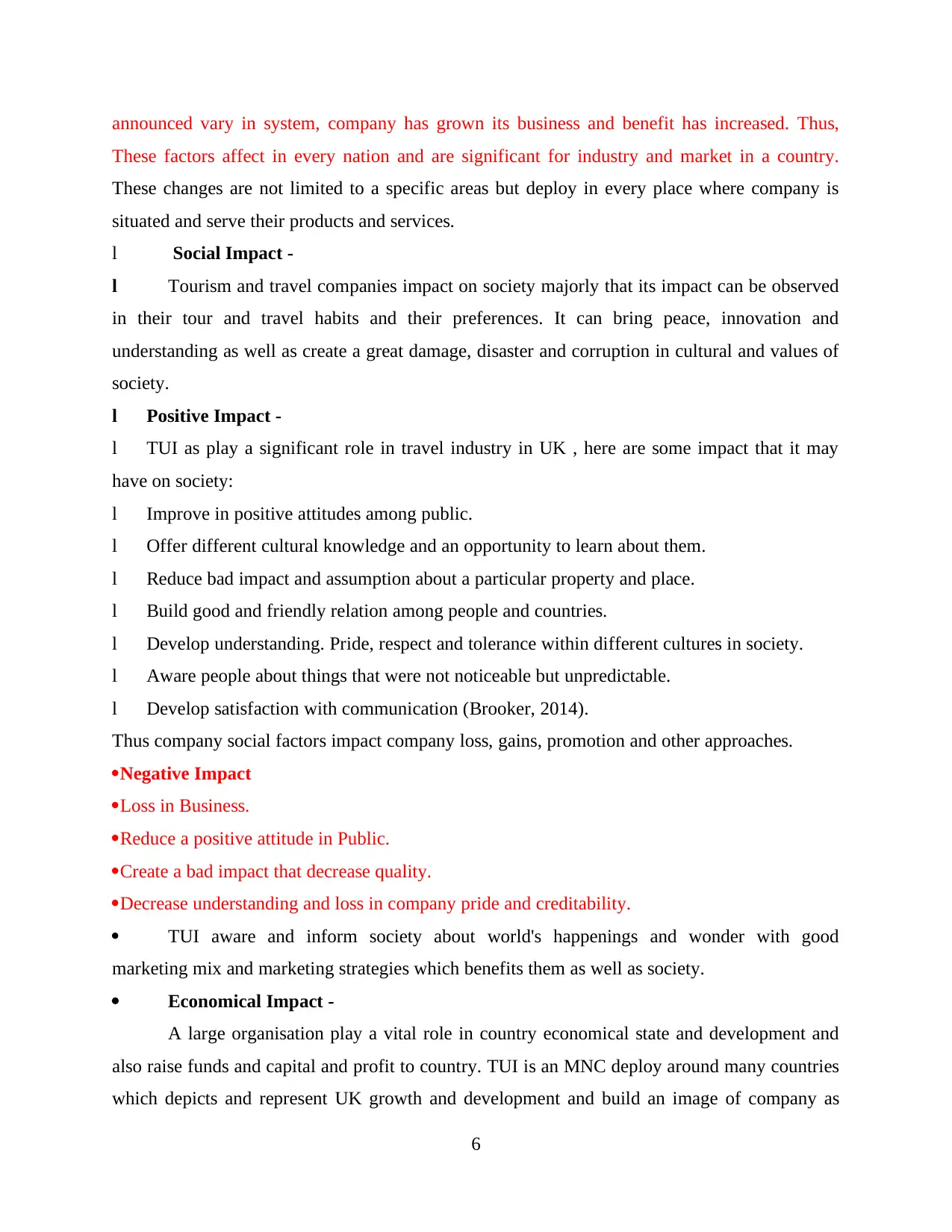
announced vary in system, company has grown its business and benefit has increased. Thus,
These factors affect in every nation and are significant for industry and market in a country.
These changes are not limited to a specific areas but deploy in every place where company is
situated and serve their products and services.
l弐弐 Social Impact -
l壱壱 Tourism and travel companies impact on society majorly that its impact can be observed
in their tour and travel habits and their preferences. It can bring peace, innovation and
understanding as well as create a great damage, disaster and corruption in cultural and values of
society.
l壱壱Positive Impact -
l弐弐TUI as play a significant role in travel industry in UK , here are some impact that it may
have on society:
l弐弐Improve in positive attitudes among public.
l弐弐Offer different cultural knowledge and an opportunity to learn about them.
l弐弐Reduce bad impact and assumption about a particular property and place.
l弐弐Build good and friendly relation among people and countries.
l弐弐Develop understanding. Pride, respect and tolerance within different cultures in society.
l弐弐Aware people about things that were not noticeable but unpredictable.
l弐弐Develop satisfaction with communication (Brooker, 2014).
Thus company social factors impact company loss, gains, promotion and other approaches.
·Negative Impact
·Loss in Business.
·Reduce a positive attitude in Public.
·Create a bad impact that decrease quality.
·Decrease understanding and loss in company pride and creditability.
· TUI aware and inform society about world's happenings and wonder with good
marketing mix and marketing strategies which benefits them as well as society.
· Economical Impact -
A large organisation play a vital role in country economical state and development and
also raise funds and capital and profit to country. TUI is an MNC deploy around many countries
which depicts and represent UK growth and development and build an image of company as
6
These factors affect in every nation and are significant for industry and market in a country.
These changes are not limited to a specific areas but deploy in every place where company is
situated and serve their products and services.
l弐弐 Social Impact -
l壱壱 Tourism and travel companies impact on society majorly that its impact can be observed
in their tour and travel habits and their preferences. It can bring peace, innovation and
understanding as well as create a great damage, disaster and corruption in cultural and values of
society.
l壱壱Positive Impact -
l弐弐TUI as play a significant role in travel industry in UK , here are some impact that it may
have on society:
l弐弐Improve in positive attitudes among public.
l弐弐Offer different cultural knowledge and an opportunity to learn about them.
l弐弐Reduce bad impact and assumption about a particular property and place.
l弐弐Build good and friendly relation among people and countries.
l弐弐Develop understanding. Pride, respect and tolerance within different cultures in society.
l弐弐Aware people about things that were not noticeable but unpredictable.
l弐弐Develop satisfaction with communication (Brooker, 2014).
Thus company social factors impact company loss, gains, promotion and other approaches.
·Negative Impact
·Loss in Business.
·Reduce a positive attitude in Public.
·Create a bad impact that decrease quality.
·Decrease understanding and loss in company pride and creditability.
· TUI aware and inform society about world's happenings and wonder with good
marketing mix and marketing strategies which benefits them as well as society.
· Economical Impact -
A large organisation play a vital role in country economical state and development and
also raise funds and capital and profit to country. TUI is an MNC deploy around many countries
which depicts and represent UK growth and development and build an image of company as
6
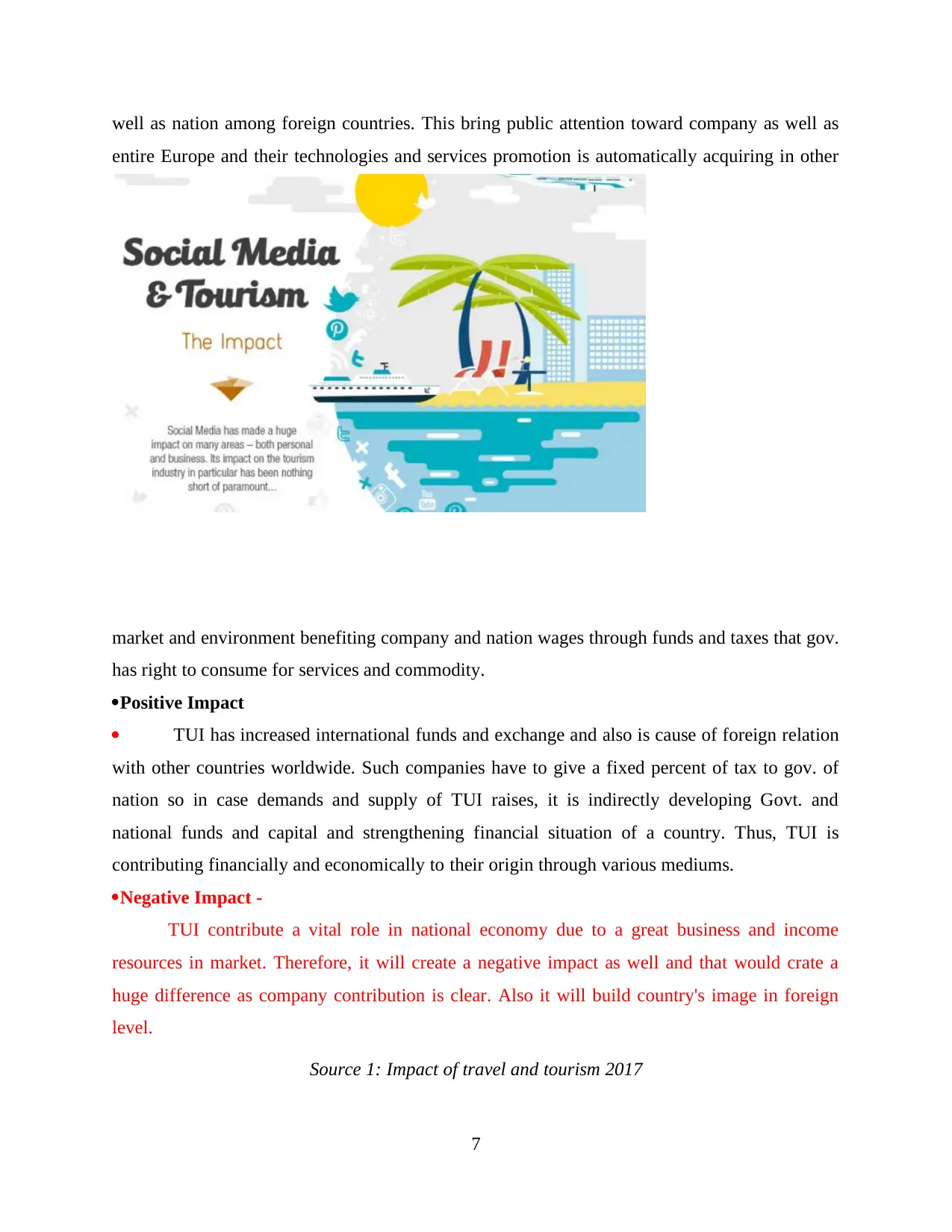
well as nation among foreign countries. This bring public attention toward company as well as
entire Europe and their technologies and services promotion is automatically acquiring in other
market and environment benefiting company and nation wages through funds and taxes that gov.
has right to consume for services and commodity.
·Positive Impact
· TUI has increased international funds and exchange and also is cause of foreign relation
with other countries worldwide. Such companies have to give a fixed percent of tax to gov. of
nation so in case demands and supply of TUI raises, it is indirectly developing Govt. and
national funds and capital and strengthening financial situation of a country. Thus, TUI is
contributing financially and economically to their origin through various mediums.
·Negative Impact -
TUI contribute a vital role in national economy due to a great business and income
resources in market. Therefore, it will create a negative impact as well and that would crate a
huge difference as company contribution is clear. Also it will build country's image in foreign
level.
Source 1: Impact of travel and tourism 2017
7
entire Europe and their technologies and services promotion is automatically acquiring in other
market and environment benefiting company and nation wages through funds and taxes that gov.
has right to consume for services and commodity.
·Positive Impact
· TUI has increased international funds and exchange and also is cause of foreign relation
with other countries worldwide. Such companies have to give a fixed percent of tax to gov. of
nation so in case demands and supply of TUI raises, it is indirectly developing Govt. and
national funds and capital and strengthening financial situation of a country. Thus, TUI is
contributing financially and economically to their origin through various mediums.
·Negative Impact -
TUI contribute a vital role in national economy due to a great business and income
resources in market. Therefore, it will create a negative impact as well and that would crate a
huge difference as company contribution is clear. Also it will build country's image in foreign
level.
Source 1: Impact of travel and tourism 2017
7
⊘ This is a preview!⊘
Do you want full access?
Subscribe today to unlock all pages.

Trusted by 1+ million students worldwide
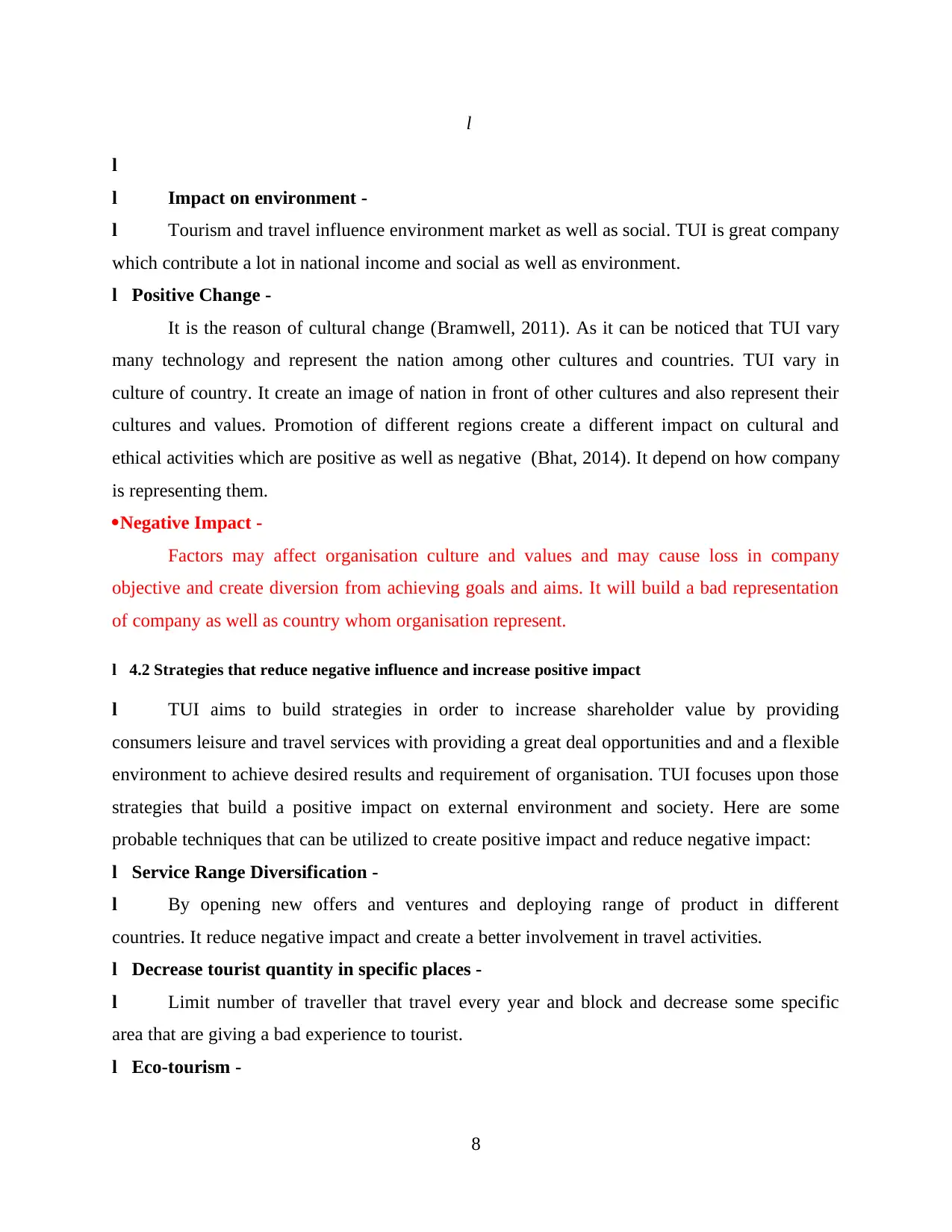
l壱
l壱
l壱 Impact on environment -
l壱 Tourism and travel influence environment market as well as social. TUI is great company
which contribute a lot in national income and social as well as environment.
l壱Positive Change -
It is the reason of cultural change (Bramwell, 2011). As it can be noticed that TUI vary
many technology and represent the nation among other cultures and countries. TUI vary in
culture of country. It create an image of nation in front of other cultures and also represent their
cultures and values. Promotion of different regions create a different impact on cultural and
ethical activities which are positive as well as negative (Bhat, 2014). It depend on how company
is representing them.
·Negative Impact -
Factors may affect organisation culture and values and may cause loss in company
objective and create diversion from achieving goals and aims. It will build a bad representation
of company as well as country whom organisation represent.
l壱4.2 Strategies that reduce negative influence and increase positive impact
l壱 TUI aims to build strategies in order to increase shareholder value by providing
consumers leisure and travel services with providing a great deal opportunities and and a flexible
environment to achieve desired results and requirement of organisation. TUI focuses upon those
strategies that build a positive impact on external environment and society. Here are some
probable techniques that can be utilized to create positive impact and reduce negative impact:
l壱Service Range Diversification -
l壱 By opening new offers and ventures and deploying range of product in different
countries. It reduce negative impact and create a better involvement in travel activities.
l壱Decrease tourist quantity in specific places -
l壱 Limit number of traveller that travel every year and block and decrease some specific
area that are giving a bad experience to tourist.
l壱Eco-tourism -
8
l壱
l壱 Impact on environment -
l壱 Tourism and travel influence environment market as well as social. TUI is great company
which contribute a lot in national income and social as well as environment.
l壱Positive Change -
It is the reason of cultural change (Bramwell, 2011). As it can be noticed that TUI vary
many technology and represent the nation among other cultures and countries. TUI vary in
culture of country. It create an image of nation in front of other cultures and also represent their
cultures and values. Promotion of different regions create a different impact on cultural and
ethical activities which are positive as well as negative (Bhat, 2014). It depend on how company
is representing them.
·Negative Impact -
Factors may affect organisation culture and values and may cause loss in company
objective and create diversion from achieving goals and aims. It will build a bad representation
of company as well as country whom organisation represent.
l壱4.2 Strategies that reduce negative influence and increase positive impact
l壱 TUI aims to build strategies in order to increase shareholder value by providing
consumers leisure and travel services with providing a great deal opportunities and and a flexible
environment to achieve desired results and requirement of organisation. TUI focuses upon those
strategies that build a positive impact on external environment and society. Here are some
probable techniques that can be utilized to create positive impact and reduce negative impact:
l壱Service Range Diversification -
l壱 By opening new offers and ventures and deploying range of product in different
countries. It reduce negative impact and create a better involvement in travel activities.
l壱Decrease tourist quantity in specific places -
l壱 Limit number of traveller that travel every year and block and decrease some specific
area that are giving a bad experience to tourist.
l壱Eco-tourism -
8
Paraphrase This Document
Need a fresh take? Get an instant paraphrase of this document with our AI Paraphraser
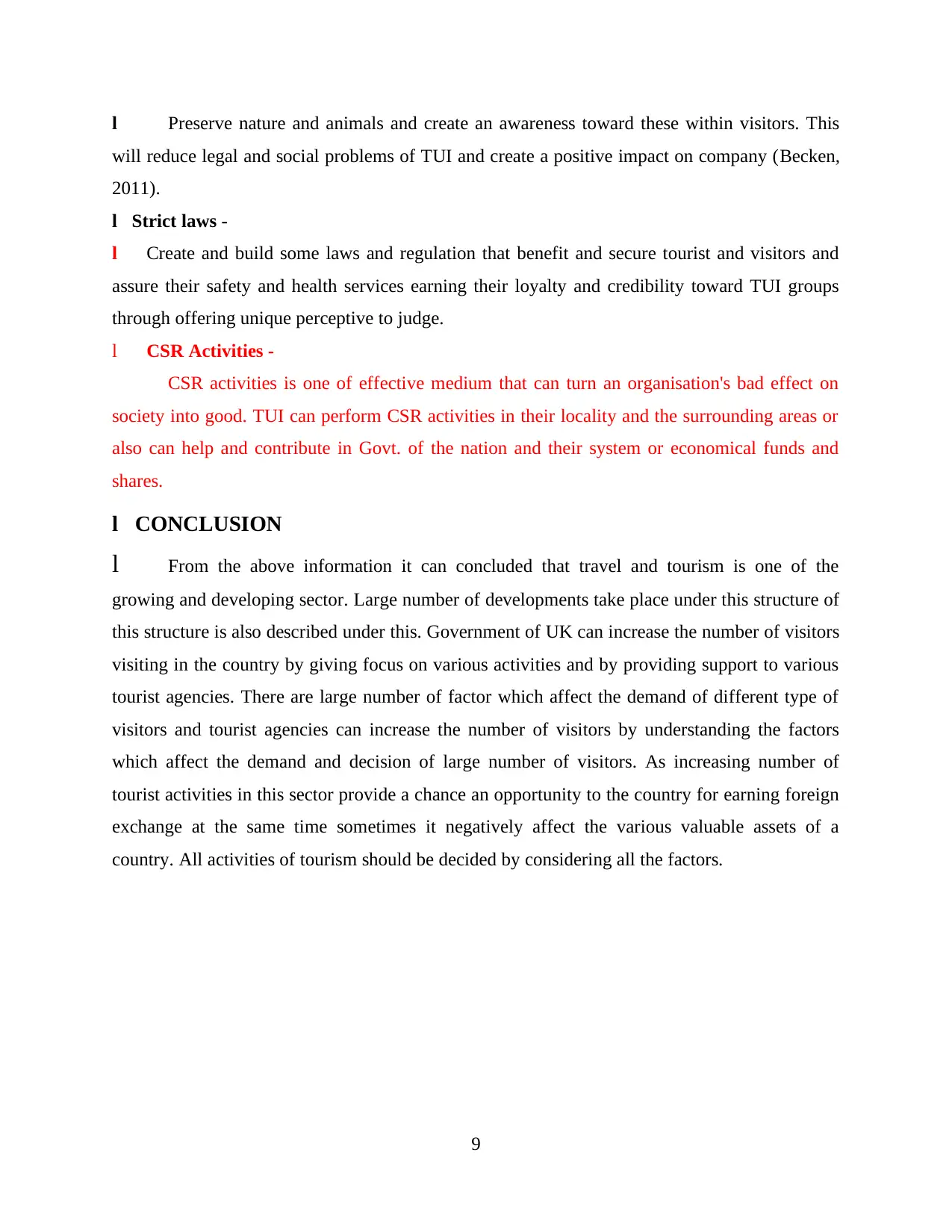
l壱 Preserve nature and animals and create an awareness toward these within visitors. This
will reduce legal and social problems of TUI and create a positive impact on company (Becken,
2011).
l壱Strict laws -
l壱壱Create and build some laws and regulation that benefit and secure tourist and visitors and
assure their safety and health services earning their loyalty and credibility toward TUI groups
through offering unique perceptive to judge.
l弐弐CSR Activities -
CSR activities is one of effective medium that can turn an organisation's bad effect on
society into good. TUI can perform CSR activities in their locality and the surrounding areas or
also can help and contribute in Govt. of the nation and their system or economical funds and
shares.
l壱CONCLUSION
l弐 From the above information it can concluded that travel and tourism is one of the
growing and developing sector. Large number of developments take place under this structure of
this structure is also described under this. Government of UK can increase the number of visitors
visiting in the country by giving focus on various activities and by providing support to various
tourist agencies. There are large number of factor which affect the demand of different type of
visitors and tourist agencies can increase the number of visitors by understanding the factors
which affect the demand and decision of large number of visitors. As increasing number of
tourist activities in this sector provide a chance an opportunity to the country for earning foreign
exchange at the same time sometimes it negatively affect the various valuable assets of a
country. All activities of tourism should be decided by considering all the factors.
9
will reduce legal and social problems of TUI and create a positive impact on company (Becken,
2011).
l壱Strict laws -
l壱壱Create and build some laws and regulation that benefit and secure tourist and visitors and
assure their safety and health services earning their loyalty and credibility toward TUI groups
through offering unique perceptive to judge.
l弐弐CSR Activities -
CSR activities is one of effective medium that can turn an organisation's bad effect on
society into good. TUI can perform CSR activities in their locality and the surrounding areas or
also can help and contribute in Govt. of the nation and their system or economical funds and
shares.
l壱CONCLUSION
l弐 From the above information it can concluded that travel and tourism is one of the
growing and developing sector. Large number of developments take place under this structure of
this structure is also described under this. Government of UK can increase the number of visitors
visiting in the country by giving focus on various activities and by providing support to various
tourist agencies. There are large number of factor which affect the demand of different type of
visitors and tourist agencies can increase the number of visitors by understanding the factors
which affect the demand and decision of large number of visitors. As increasing number of
tourist activities in this sector provide a chance an opportunity to the country for earning foreign
exchange at the same time sometimes it negatively affect the various valuable assets of a
country. All activities of tourism should be decided by considering all the factors.
9
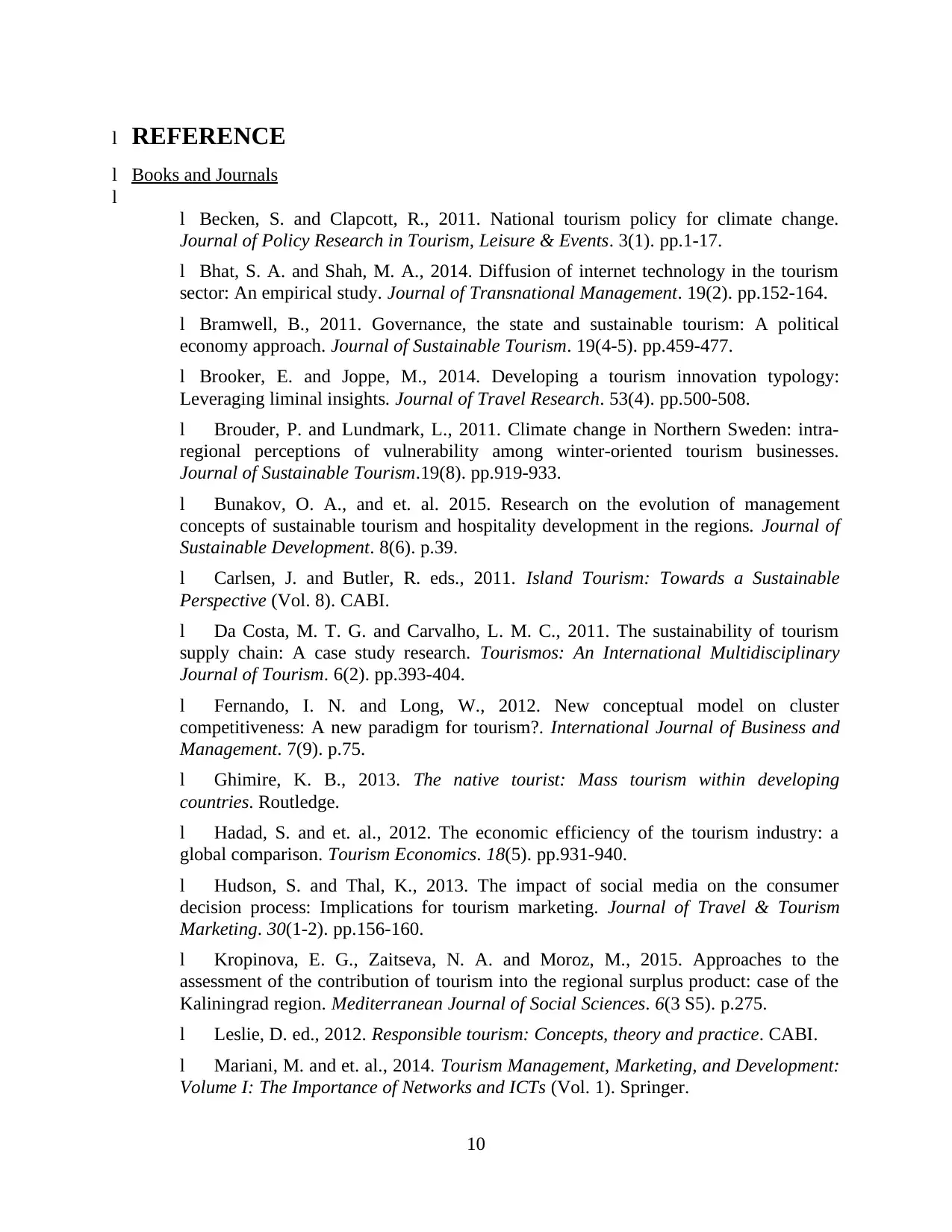
l弐REFERENCE
l弐Books and Journals
l弐
l弐Becken, S. and Clapcott, R., 2011. National tourism policy for climate change.
Journal of Policy Research in Tourism, Leisure & Events. 3(1). pp.1-17.
l弐Bhat, S. A. and Shah, M. A., 2014. Diffusion of internet technology in the tourism
sector: An empirical study. Journal of Transnational Management. 19(2). pp.152-164.
l弐Bramwell, B., 2011. Governance, the state and sustainable tourism: A political
economy approach. Journal of Sustainable Tourism. 19(4-5). pp.459-477.
l弐Brooker, E. and Joppe, M., 2014. Developing a tourism innovation typology:
Leveraging liminal insights. Journal of Travel Research. 53(4). pp.500-508.
l弐弐Brouder, P. and Lundmark, L., 2011. Climate change in Northern Sweden: intra-
regional perceptions of vulnerability among winter-oriented tourism businesses.
Journal of Sustainable Tourism.19(8). pp.919-933.
l弐弐Bunakov, O. A., and et. al. 2015. Research on the evolution of management
concepts of sustainable tourism and hospitality development in the regions. Journal of
Sustainable Development. 8(6). p.39.
l弐弐Carlsen, J. and Butler, R. eds., 2011. Island Tourism: Towards a Sustainable
Perspective (Vol. 8). CABI.
l弐弐Da Costa, M. T. G. and Carvalho, L. M. C., 2011. The sustainability of tourism
supply chain: A case study research. Tourismos: An International Multidisciplinary
Journal of Tourism. 6(2). pp.393-404.
l弐弐Fernando, I. N. and Long, W., 2012. New conceptual model on cluster
competitiveness: A new paradigm for tourism?. International Journal of Business and
Management. 7(9). p.75.
l弐弐Ghimire, K. B., 2013. The native tourist: Mass tourism within developing
countries. Routledge.
l弐弐Hadad, S. and et. al., 2012. The economic efficiency of the tourism industry: a
global comparison. Tourism Economics. 18(5). pp.931-940.
l弐弐Hudson, S. and Thal, K., 2013. The impact of social media on the consumer
decision process: Implications for tourism marketing. Journal of Travel & Tourism
Marketing. 30(1-2). pp.156-160.
l弐弐Kropinova, E. G., Zaitseva, N. A. and Moroz, M., 2015. Approaches to the
assessment of the contribution of tourism into the regional surplus product: case of the
Kaliningrad region. Mediterranean Journal of Social Sciences. 6(3 S5). p.275.
l弐弐Leslie, D. ed., 2012. Responsible tourism: Concepts, theory and practice. CABI.
l弐弐Mariani, M. and et. al., 2014. Tourism Management, Marketing, and Development:
Volume I: The Importance of Networks and ICTs (Vol. 1). Springer.
10
l弐Books and Journals
l弐
l弐Becken, S. and Clapcott, R., 2011. National tourism policy for climate change.
Journal of Policy Research in Tourism, Leisure & Events. 3(1). pp.1-17.
l弐Bhat, S. A. and Shah, M. A., 2014. Diffusion of internet technology in the tourism
sector: An empirical study. Journal of Transnational Management. 19(2). pp.152-164.
l弐Bramwell, B., 2011. Governance, the state and sustainable tourism: A political
economy approach. Journal of Sustainable Tourism. 19(4-5). pp.459-477.
l弐Brooker, E. and Joppe, M., 2014. Developing a tourism innovation typology:
Leveraging liminal insights. Journal of Travel Research. 53(4). pp.500-508.
l弐弐Brouder, P. and Lundmark, L., 2011. Climate change in Northern Sweden: intra-
regional perceptions of vulnerability among winter-oriented tourism businesses.
Journal of Sustainable Tourism.19(8). pp.919-933.
l弐弐Bunakov, O. A., and et. al. 2015. Research on the evolution of management
concepts of sustainable tourism and hospitality development in the regions. Journal of
Sustainable Development. 8(6). p.39.
l弐弐Carlsen, J. and Butler, R. eds., 2011. Island Tourism: Towards a Sustainable
Perspective (Vol. 8). CABI.
l弐弐Da Costa, M. T. G. and Carvalho, L. M. C., 2011. The sustainability of tourism
supply chain: A case study research. Tourismos: An International Multidisciplinary
Journal of Tourism. 6(2). pp.393-404.
l弐弐Fernando, I. N. and Long, W., 2012. New conceptual model on cluster
competitiveness: A new paradigm for tourism?. International Journal of Business and
Management. 7(9). p.75.
l弐弐Ghimire, K. B., 2013. The native tourist: Mass tourism within developing
countries. Routledge.
l弐弐Hadad, S. and et. al., 2012. The economic efficiency of the tourism industry: a
global comparison. Tourism Economics. 18(5). pp.931-940.
l弐弐Hudson, S. and Thal, K., 2013. The impact of social media on the consumer
decision process: Implications for tourism marketing. Journal of Travel & Tourism
Marketing. 30(1-2). pp.156-160.
l弐弐Kropinova, E. G., Zaitseva, N. A. and Moroz, M., 2015. Approaches to the
assessment of the contribution of tourism into the regional surplus product: case of the
Kaliningrad region. Mediterranean Journal of Social Sciences. 6(3 S5). p.275.
l弐弐Leslie, D. ed., 2012. Responsible tourism: Concepts, theory and practice. CABI.
l弐弐Mariani, M. and et. al., 2014. Tourism Management, Marketing, and Development:
Volume I: The Importance of Networks and ICTs (Vol. 1). Springer.
10
⊘ This is a preview!⊘
Do you want full access?
Subscribe today to unlock all pages.

Trusted by 1+ million students worldwide
1 out of 14
Related Documents
Your All-in-One AI-Powered Toolkit for Academic Success.
+13062052269
info@desklib.com
Available 24*7 on WhatsApp / Email
![[object Object]](/_next/static/media/star-bottom.7253800d.svg)
Unlock your academic potential
Copyright © 2020–2026 A2Z Services. All Rights Reserved. Developed and managed by ZUCOL.




